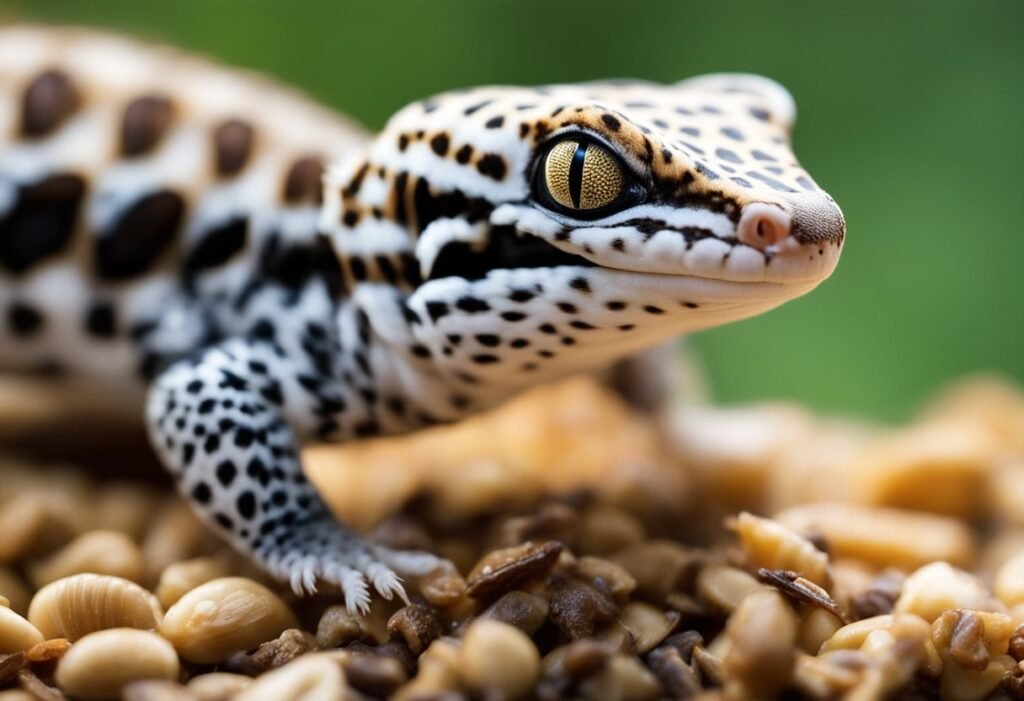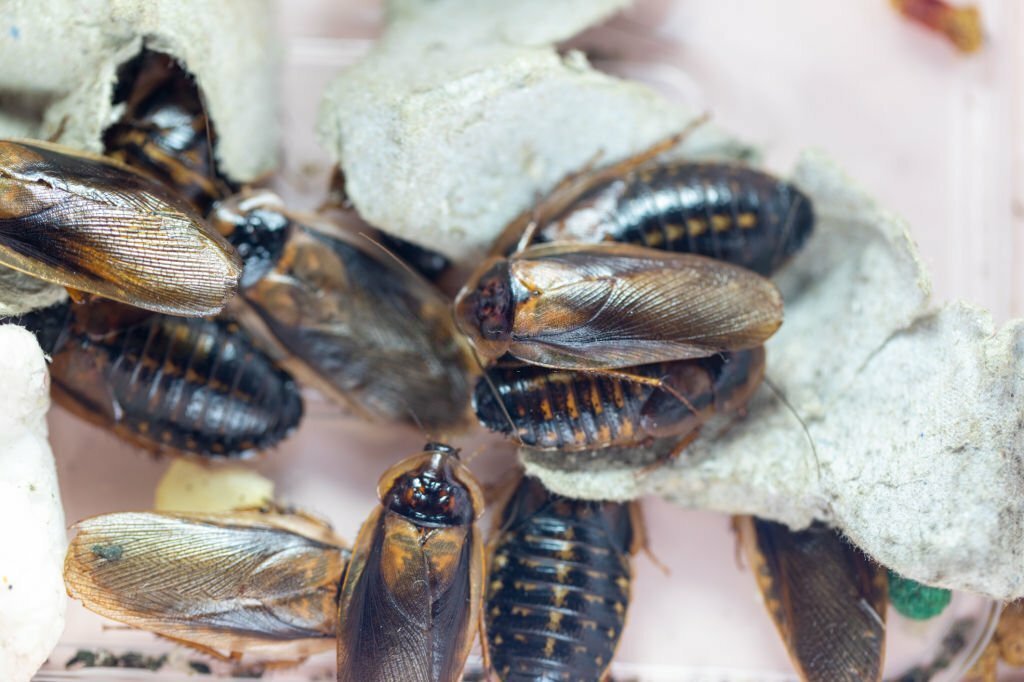Leopard geckos are one of the most popular reptile species kept as pets. They are known for their docile nature, low maintenance, and unique appearance. As a responsible owner, it is important to provide your leopard gecko with a well-balanced diet that meets their nutritional needs. One common question that arises is whether leopard geckos can eat dubia roaches.
Dubia roaches are a popular feeder insect for many reptiles, including bearded dragons and chameleons. They are high in protein and low in fat, making them a nutritious food source. However, when it comes to feeding dubia roaches to leopard geckos, there are some important considerations to keep in mind. In this article, we will explore whether dubia roaches are a suitable food source for leopard geckos and provide information on how to safely incorporate them into their diet.
Dietary Benefits of Dubia Roaches for Leopard Geckos

Dubia roaches are a great source of nutrition for leopard geckos. They are high in protein, low in fat, and have a good calcium to phosphorus ratio. Here are some of the dietary benefits of feeding dubia roaches to your leopard gecko:
- Protein: Dubia roaches are a great source of protein for leopard geckos. Protein is essential for growth and development, and it also helps maintain muscle mass.
- Calcium: Dubia roaches have a good calcium to phosphorus ratio, which is important for leopard geckos. Calcium is necessary for strong bones and teeth, and it also helps with muscle function and nerve transmission.
- Low Fat: Dubia roaches are low in fat, which is important for leopard geckos. Too much fat can lead to obesity and other health problems.
- Variety: Feeding your leopard gecko a variety of foods is important for their overall health and well-being. Dubia roaches are a great addition to a varied diet.
When feeding dubia roaches to your leopard gecko, it’s important to make sure they are properly gut-loaded and dusted with calcium powder. Gut-loading means feeding the roaches a nutritious diet before feeding them to your leopard gecko. This ensures that your leopard gecko is getting the most nutrition possible from the roaches. Dusting the roaches with calcium powder is also important, as it helps ensure that your leopard gecko is getting enough calcium in their diet.
Overall, dubia roaches are a great addition to a leopard gecko’s diet. They are high in protein, low in fat, and have a good calcium to phosphorus ratio. Feeding your leopard gecko a variety of foods, including dubia roaches, is important for their overall health and well-being.
Nutritional Profile of Dubia Roaches
Dubia roaches are a popular feeder insect for many reptiles, including leopard geckos. These roaches have a well-balanced nutritional profile that makes them a great addition to a gecko’s diet.
Dubia roaches are high in protein, which is essential for the growth and maintenance of muscle tissue. They also contain a good amount of fat, which provides energy for daily activities. In addition, dubia roaches are low in carbohydrates, making them a great option for geckos that require a low-carb diet.
One of the most notable features of dubia roaches is their calcium to phosphorus ratio. This ratio is critical for reptiles, as a diet high in phosphorus can lead to calcium deficiencies and metabolic bone disease. Dubia roaches have a calcium to phosphorus ratio of about 1:1.5, which is ideal for leopard geckos.
Dubia roaches are also a good source of vitamins and minerals. They contain vitamin B12, which is essential for nerve function and the production of red blood cells. They also contain iron, which is necessary for the production of hemoglobin, the protein that carries oxygen in the blood.
Overall, dubia roaches are a nutritious and well-rounded feeder insect for leopard geckos. When fed as part of a balanced diet, they can help ensure that your gecko is getting all the nutrients they need to thrive.
How to Prepare Dubia Roaches for Feeding
When it comes to feeding leopard geckos, dubia roaches are a popular choice for their high protein content and easy digestion. However, it is important to prepare them properly to ensure that they are safe and nutritious for your gecko to eat.
Firstly, we recommend purchasing dubia roaches from a reputable source to ensure that they are healthy and free from any harmful bacteria or parasites. Once you have obtained the roaches, you will need to prepare them for feeding.
One way to prepare dubia roaches is to gut-load them with nutritious foods such as fruits and vegetables. This will provide your gecko with additional vitamins and minerals. You can also dust the roaches with a calcium supplement powder to ensure that your gecko is getting enough calcium in their diet.
Before feeding the dubia roaches to your gecko, it is important to ensure that they are the appropriate size. As a general rule, the roaches should be no larger than the width of your gecko’s head. This will prevent any choking hazards or digestive issues.
To make feeding easier, you can place the dubia roaches in a feeding dish or sprinkle them throughout your gecko’s enclosure. This will allow your gecko to hunt and forage for their food, which is a natural behavior for them.
By following these simple steps, you can prepare dubia roaches for feeding and provide your leopard gecko with a nutritious and delicious meal.
Appropriate Feeding Schedule and Quantity

When feeding leopard geckos dubia roaches, it is important to establish an appropriate feeding schedule and quantity to ensure their health and well-being.
We recommend feeding adult leopard geckos every other day and juvenile leopard geckos daily. It is important to monitor their weight and adjust the feeding schedule accordingly.
When it comes to the quantity of dubia roaches to feed, it is best to offer a number of roaches that is equivalent to the size of the gecko’s head. This ensures that they are not overfed and helps prevent obesity.
It is also important to provide a varied diet for leopard geckos. While dubia roaches can be a staple food source, it is recommended to also offer other insects such as crickets, mealworms, and waxworms.
Overall, maintaining an appropriate feeding schedule and quantity, along with a varied diet, is crucial for the health and happiness of leopard geckos.
Potential Risks and Considerations
When considering feeding leopard geckos Dubia roaches, there are a few potential risks and considerations to keep in mind. While Dubia roaches are a nutritious and protein-rich food source, there are some factors to consider before adding them to your gecko’s diet.
Size
Dubia roaches can grow to be quite large, and it’s important to ensure that the size of the roach is appropriate for your gecko. Feeding your gecko roaches that are too large can lead to digestive issues, impaction, and other health problems. It’s important to choose roaches that are no larger than the width of your gecko’s head.
Gut Loading
Dubia roaches are known for being excellent at “gut loading,” or absorbing nutrients from their food and passing those nutrients on to the animal that eats them. However, it’s important to ensure that the roaches are being fed a nutritious diet themselves in order to pass on those nutrients to your gecko. Feeding your gecko roaches that have not been properly gut loaded can lead to nutritional deficiencies.
Allergies
Some geckos may have allergies or sensitivities to certain types of food, including Dubia roaches. If you notice any signs of allergic reactions, such as skin irritation or respiratory issues, it’s important to discontinue feeding Dubia roaches and consult with a veterinarian.
Parasites
Like any live food source, Dubia roaches can potentially carry parasites or other harmful organisms. It’s important to purchase Dubia roaches from a reputable source and to inspect them carefully before feeding them to your gecko. Additionally, it’s a good idea to quarantine any new roaches for a period of time before feeding them to your gecko to ensure that they are healthy and parasite-free.
Overall, feeding leopard geckos Dubia roaches can be a nutritious and healthy addition to their diet, but it’s important to consider these potential risks and take steps to mitigate them. With proper care and attention, Dubia roaches can be a safe and beneficial food source for your gecko.
Alternatives to Dubia Roaches in Leopard Gecko Diet

While dubia roaches are a popular choice for leopard gecko diet, there are several other options that can be included in their diet. Here are some alternatives to dubia roaches:
Crickets
Crickets are a common staple in leopard gecko diet. They are readily available at most pet stores and are easy to breed at home. They are a good source of protein and can be gut-loaded with nutritious food before being fed to the geckos.
Mealworms
Mealworms are another popular option for leopard gecko diet. They are easy to find and can be kept in a container at home. They are high in protein and can be fed to geckos in moderation.
Superworms
Superworms are larger than mealworms and are a good option for adult leopard geckos. They are high in protein and can be fed to geckos in moderation.
Waxworms
Waxworms are a high-fat treat that can be given to leopard geckos in moderation. They are not a good staple food, but can be used as a treat or to entice a picky eater to eat.
Silkworms
Silkworms are a nutritious option for leopard gecko diet. They are high in protein and low in fat, making them a good staple food for geckos. They are not as readily available as other options, but can be ordered online.
Overall, there are several alternatives to dubia roaches that can be included in leopard gecko diet. It is important to provide a varied diet to ensure that the geckos are getting all the nutrients they need.
Frequently Asked Questions
What are the benefits of feeding Dubia roaches to leopard geckos compared to other insects?
Dubia roaches are a nutritious and healthy food source for leopard geckos. They have a high protein content and are low in fat, making them an excellent choice for maintaining your pet’s health. Compared to crickets, Dubia roaches are less likely to carry parasites and are easier to digest.
How should Dubia roaches be prepared or gut loaded before offering them to leopard geckos?
Dubia roaches should be fed a nutritious diet for at least 24 hours before being offered to leopard geckos. This process is known as gut loading and ensures that the roaches are full of nutrients that will be passed on to your pet. You can also dust the roaches with a calcium and vitamin supplement before feeding them to your gecko.
What is the appropriate number of Dubia roaches to feed a juvenile leopard gecko?
Juvenile leopard geckos should be fed 2-3 appropriately sized Dubia roaches per day. As they grow, the number of roaches can be increased. It is important not to overfeed your gecko, as this can lead to obesity and other health problems.
Can leopard geckos have a varied diet that includes insects other than Dubia roaches?
Yes, leopard geckos can have a varied diet that includes other insects such as crickets, mealworms, and waxworms. However, it is important to ensure that the insects are appropriate in size and nutritional content for your gecko.
Are there any risks associated with feeding leopard geckos wild-caught insects?
Yes, there are risks associated with feeding leopard geckos wild-caught insects. Wild-caught insects may carry parasites or diseases that can be harmful to your pet. It is best to feed your gecko captive-bred insects or insects that have been purchased from a reputable source.
What other feeder insects can be considered as alternatives to Dubia roaches for leopard geckos?
Other feeder insects that can be considered as alternatives to Dubia roaches for leopard geckos include crickets, mealworms, waxworms, and superworms. Each insect has its own nutritional content and should be fed in moderation to maintain your gecko’s health.





